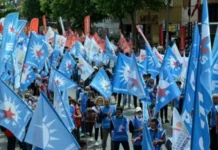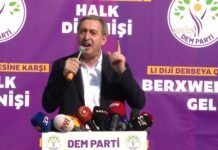An opposition lawmaker has written a column drawing attention to the predicament of children whose parents were sent to jail in October on charges of links to the faith-based Gülen movement, leaving them to stay in a tent with relatives whose house was destroyed in last year’s earthquakes.
Mustafa Yeneroğlu, a politician who previously parted ways with the ruling party to join the opposition, authored a piece titled “Are the parents of quintuplets really terrorists?” in which he explained that their case epitomizes the wider and systematic injustices in Turkey.
“This is one of hundreds of thousands of trials that have been conducted for over seven years in disregard of fundamental legal principles, most notably that of ‘no punishment without a crime’,” Yeneroğlu wrote, pointing out that the investigations into alleged members of the Gülen movement typically rely as evidence on acts that were not explicitly outlawed at the time of commission and were later retroactively criminalized.
Nurcan and Abdülkadir Arslan, the parents of 7-year-old quintuplets and a daughter aged 13, were handed down prison sentences on terrorism-related charges due to their work for tutoring centers shut down by government decree, their accounts at the Gülen-affiliated Bank Asya and their alleged use of ByLock, a mobile messaging app that Turkish authorities claim was exclusively used among the group’s members.
“If we are to accept that these acts constitute crimes, then many executives of the ruling Justice and Development Party [AKP] would need to be in jail, including the brother of Justice Minister Yılmaz Tunç,” Yeneroğlu said.
He also highlighted a landmark judgment delivered last year by the European Court of Human Rights (ECtHR), which said that the use of ByLock by itself cannot be interpreted as evidence of terrorism.
The children of the Arslan couple were the subject of a widespread public outcry after the release of a video in which they were seen being separated from their parents, who were being sent to prison.
Ömer Faruk Gergerlioğu, a leading rights advocate and another opposition MP, had later revealed that they were staying with relatives in a tent in a province hit by last year’s major earthquakes.
Turkish President Recep Tayyip Erdoğan has been targeting followers of the Gülen movement, inspired by Turkish Muslim cleric Fethullah Gülen, since the corruption investigations of December 17-25, 2013, which implicated then-prime minister Erdoğan, his family members and his inner circle.
Dismissing the investigations as a Gülenist coup and conspiracy against his government, Erdoğan designated the movement as a terrorist organization and began to target its members. He intensified the crackdown on the movement following an abortive putsch in 2016 that he accused Gülen of masterminding. Gülen and the movement strongly deny involvement in the coup attempt or any terrorist activity.
In addition to the thousands who were jailed, scores of other Gülen movement followers had to flee Turkey to avoid the government crackdown.















